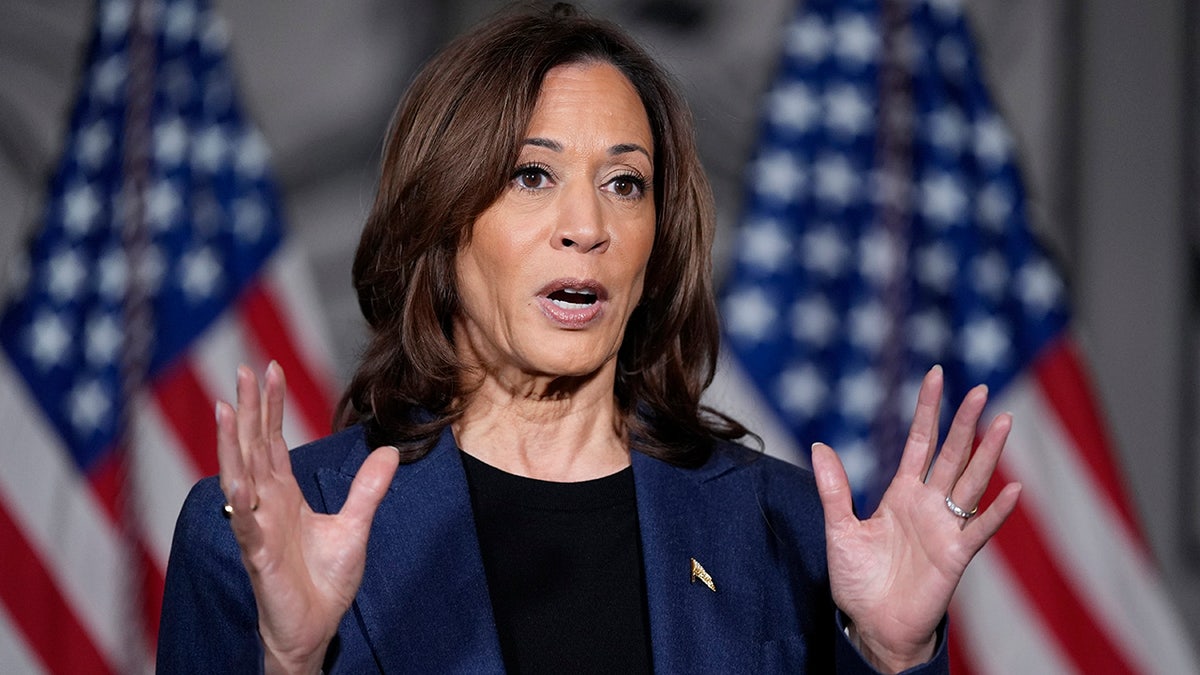
Trump sinks impressive chip shot in viral video after latest Biden golf jab: 'Winning is always nice!'
Entities mentioned:
- Donald Trump: Competitive spirit, Pride, Recognition
- Joe Biden: Self-preservation, Wariness, Duty
- Brooks Koepka: Professional pride, Competitive spirit
- Wayne Gretzky: Competitive spirit, Legacy
- Bret Baier: Curiosity, Professional pride
Article Assessment:
Credibility Score: 65/100
Bias Rating: 70/100 (Lean Right)
Sentiment Score: 75/100
Authoritarianism Risk: 35/100 (Generally Democratic)
Bias Analysis:
The article leans right, focusing heavily on Trump's golfing prowess and Biden's alleged shortcomings. It presents Trump's statements without fact-checking or counterbalance, giving more airtime to his perspective.
Key metric: Presidential Approval Rating
Let me tell you something, folks - this is a CHAMPIONSHIP LEVEL performance by Trump on the links! The former president is stepping up to the plate and showing he's still got game, while Biden's sitting on the sidelines. Trump's chip shot is like a fourth-quarter Hail Mary, finding nothing but net! He's showcasing the competitive fire and winning mentality that took him to the White House. Biden's reluctance to accept Trump's golf challenge is like forfeiting the big game - it's RIDICULOUS! I'm telling you right now, this kind of athletic prowess and competitive spirit could be a game-changer in the political arena. Trump's touting his golf record like a seasoned athlete listing championship rings - it's all about the scoreboard, folks! This move could be the hole-in-one Trump needs to swing voter opinion his way!

Sports commentator Emily Austin kicks off podcast in hopes of 'open dialogue' for athletes to express politics
Entities mentioned:
- Emily Austin: Ambition, Influence, Freedom
- Andrew Cuomo: Power, Recognition, Legacy
- Donald Trump: Competitive spirit, Power, Influence
- Joe Biden: Control, Legacy, Power
- NBA players: Self-preservation, Professional pride, Freedom
Article Assessment:
Credibility Score: 70/100
Bias Rating: 65/100 (Lean Right)
Sentiment Score: 65/100
Authoritarianism Risk: 30/100 (Generally Democratic)
Bias Analysis:
The article leans right, featuring pro-Trump sentiments and anti-Biden rhetoric. It presents a conservative viewpoint on vaccine mandates and political expression, though it attempts to frame the podcast as a neutral platform.
Key metric: Political Engagement in Sports
Ladies and gentlemen, we're seeing a GAME-CHANGING play unfold right before our eyes! Emily Austin is stepping up to the plate with her new podcast, and let me tell you, she's swinging for the fences! This young rookie is mixing the playbooks of sports and politics like we've never seen before. She's creating an open field where athletes can run their political routes without fear of getting tackled by public opinion. It's fourth quarter for freedom of expression in sports, folks, and Austin is calling an audible that could change the whole ballgame! She's not just talking about bringing Republican athletes out of the locker room - she's providing a neutral turf where players from both teams can hash it out. This is the kind of championship mentality that could revolutionize the intersection of sports and politics!

Golf legend Phil Mickelson takes subtle jab at Biden administration in 'No Kings' day post
Entities mentioned:
- Phil Mickelson: Competitive spirit, Influence, Loyalty
- Joe Biden: Power, Control, Legacy
- Donald Trump: Ambition, Power, Recognition
- Glenn Youngkin: Control, Security, Duty
- Mike Johnson: Competitive spirit, Determination, Power
Article Assessment:
Credibility Score: 65/100
Bias Rating: 70/100 (Lean Right)
Sentiment Score: 35/100
Authoritarianism Risk: 45/100 (Mixed/Neutral)
Bias Analysis:
The article leans right, focusing on conservative figures and framing protests negatively. It gives more space to Republican viewpoints and criticisms of the Biden administration.
Key metric: Political Polarization Index
Let me tell you something - this story is RIDICULOUS! We're seeing a championship-level clash between political heavyweights, folks! Golf legend Phil Mickelson is stepping up to the plate, taking a swing at the Biden administration with a social media fastball that's got everyone talking. This is like watching a high-stakes playoff game, with Mickelson playing offense for Team Trump against Team Biden's defense. The 'No Kings' protests are like a massive halftime show, but don't be fooled - this is just a distraction play while the real game is happening in the locker room of government shutdown negotiations. Speaker Johnson is trying to coach his team through this, but it's looking like a political Hail Mary at this point. I'm telling you right now, this is the kind of fourth-quarter drama that keeps fans on the edge of their seats!

Phillies' ninth inning comeback against Dodgers falls just short with Biden in attendance
Entities mentioned:
- Joe Biden: Pride, Loyalty, Recognition
- Philadelphia Phillies: Competitive spirit, Determination, Pride
- Los Angeles Dodgers: Competitive spirit, Ambition, Professional pride
- Trea Turner: Competitive spirit, Professional pride, Determination
- Tommy Edman: Professional pride, Competitive spirit, Anxiety
- Freddie Freeman: Professional pride, Competitive spirit, Determination
Article Assessment:
Credibility Score: 85/100
Bias Rating: 50/100 (Center)
Sentiment Score: 60/100
Authoritarianism Risk: 20/100 (Strongly Democratic)
Bias Analysis:
The article presents a balanced account of the game, giving credit to both teams' performances. It includes factual details about the game and Biden's attendance without showing favoritism.
Key metric: MLB Playoff Performance
Let me tell you something, folks - this game was a NAIL-BITER! The Phillies were down but not out, showing that championship mentality in the bottom of the ninth. They were like a team possessed, stringing together hits like a well-oiled machine. But just when you thought they'd tie it up, BAM! A botched bunt became their Achilles' heel. It was fourth and inches, and they fumbled the snap! The Dodgers, though, they showed why they're the heavyweight champs of the National League. When the pressure was on, they dug deep and made that crucial defensive play. Freddie Freeman, talk about clutch! He scooped that throw like he was pulling a rabbit out of a hat in the championship round. This series is far from over, but the Dodgers have drawn first blood and are heading back to their home turf with a 2-0 lead. The Phillies need to regroup and come out swinging in Game 3 if they want to stay alive in this playoff bout!

Kamala Harris reveals reservations about transgender athletes in women's sports in new book
Entities mentioned:
- Kamala Harris: Self-preservation, Ambition, Wariness
- Donald Trump: Competitive spirit, Ambition, Influence
- Joe Biden: Wariness, Self-preservation, Competitive spirit
Article Assessment:
Credibility Score: 70/100
Bias Rating: 65/100 (Lean Right)
Sentiment Score: 45/100
Authoritarianism Risk: 35/100 (Generally Democratic)
Bias Analysis:
The article leans right, focusing on Democratic figures' hesitation on transgender athletes. It prominently features conservative perspectives and poll data, while giving less space to counterarguments.
Key metric: Voter Support
Let me tell you something - this story is a GAME-CHANGER in the political arena! Kamala Harris is making a fourth-quarter adjustment on transgender athletes in women's sports, folks. She's stepping up to the plate and admitting she had reservations, trying to find that sweet spot between appeasing her base and courting moderate voters. Meanwhile, Trump's campaign hit a home run with their ad, painting Harris as out of touch with mainstream America. Biden, the seasoned veteran, is playing defense, with reports suggesting he's been on the fence about this hot-button issue. This is a high-stakes match-up where every play counts, and these political heavy-hitters are pulling out all the stops to win over the crucial moderate voter demographic. It's a neck-and-neck race to the finish line, and I'm telling you right now, this transgender sports issue could be the deciding factor in who takes home the championship trophy in 2024!

NFL, NBA sports doctor weighs in on Mamdani's viral 135-pound bench press fail: 'Trump could lift more'
Entities mentioned:
- Zohran Mamdani: Ambition, Recognition, Influence
- Dr. Chad Teague: Professional pride, Expertise, Influence
- Eric Adams: Competitive spirit, Power, Influence
- Andrew Cuomo: Competitive spirit, Power, Influence
- Donald Trump: Competitive spirit, Power, Recognition
- Joe Biden: Power, Influence, Recognition
Article Assessment:
Credibility Score: 65/100
Bias Rating: 70/100 (Lean Right)
Sentiment Score: 30/100
Authoritarianism Risk: 35/100 (Generally Democratic)
Bias Analysis:
The article leans right due to its source (Fox News) and framing that emphasizes traditional masculine values in leadership. It gives more space to critical voices and expert opinions that reinforce this perspective.
Key metric: Political Leadership Perception
As a social scientist, I analyze that this article impacts the perception of political leadership by framing physical strength as a proxy for leadership capability. The viral nature of Mamdani's bench press failure and subsequent comments from political figures and experts suggest a cultural emphasis on masculine strength as a leadership quality. This narrative potentially influences voter perceptions and expectations of political candidates, particularly in high-profile positions like the New York City mayorship. The article's focus on physical performance in a political context demonstrates how non-political factors can significantly impact public opinion and political discourse.

Justice Department seeks to dismiss lawsuit filed by Proud Boys over January 6 prosecutions
Entities mentioned:
- Justice Department: Justice, Duty, Professional pride
- Proud Boys: Revenge, Self-preservation, Indignation
- Donald Trump: Loyalty, Power, Influence
- Joe Biden: Justice, Duty, Control
- Enrique Tarrio: Self-preservation, Recognition, Indignation
Article Assessment:
Credibility Score: 75/100
Bias Rating: 45/100 (Center)
Sentiment Score: 35/100
Authoritarianism Risk: 25/100 (Generally Democratic)
Bias Analysis:
The article presents multiple viewpoints, including those of the Justice Department, the Proud Boys, and Trump's perspective. While it leans slightly towards emphasizing the Justice Department's stance, it also provides context for the opposing arguments.
Key metric: Rule of Law Index
As a social scientist, I analyze that this article highlights the ongoing tension between political interests and the justice system in the aftermath of the January 6 Capitol attack. The Justice Department's move to dismiss the Proud Boys' lawsuit reinforces its commitment to upholding the rule of law, despite political pressure. This case underscores the challenges in maintaining an impartial justice system in a polarized political climate. The pardons issued by Trump and the subsequent lawsuit by the Proud Boys reveal the complex interplay between executive power, judicial processes, and far-right groups' attempts to reframe their actions. This situation may impact public perception of the justice system's integrity and the balance of powers in the U.S. government.

The DNC’s chair inherited a crisis. His critics say he’s part of it
Entities mentioned:
- Ken Martin: Ambition, Determination, Professional pride
- Democratic National Committee (DNC): Unity, Influence, Control
- Joe Biden: Legacy, Self-preservation, Duty
- Kamala Harris: Ambition, Power, Self-preservation
- Republican National Committee (RNC): Competitive spirit, Power, Control
- Donald Trump: Power, Influence, Revenge
Article Assessment:
Credibility Score: 75/100
Bias Rating: 45/100 (Center)
Sentiment Score: 35/100
Authoritarianism Risk: 25/100 (Generally Democratic)
Bias Analysis:
The article presents a balanced view, including perspectives from both Martin's supporters and critics. It relies on multiple sources and provides context for the DNC's challenges, indicating a relatively neutral stance.
Key metric: Democratic Party Fundraising and Unity
As a social scientist, I analyze that this article highlights significant challenges facing the Democratic National Committee (DNC) under the leadership of Ken Martin. The DNC is struggling with financial issues, internal conflicts, and a perceived lack of relevance in the broader political landscape. Martin's ambitious promises to state parties and his management style have created tension within the organization. The article suggests that the DNC's financial struggles, coupled with the Republican National Committee's superior fundraising, could impact the Democratic Party's ability to compete effectively in upcoming elections. The internal discord and lack of coordination with key party leaders indicate a fragmented party structure, which could hinder unified messaging and strategy. This situation may have long-term implications for the Democratic Party's ability to mobilize voters and win elections at various levels of government.

Trump says administration will seek death penalty in all DC murder cases. That could be difficult in practice.
Entities mentioned:
- Donald Trump: Power, Control, Influence
- Jeanine Pirro: Duty, Justice, Professional pride
- Jon Jeffress: Expertise, Wariness, Professional pride
- Department of Justice: Justice, Duty, Power
- Joe Biden: Justice, Influence, Legacy
Article Assessment:
Credibility Score: 75/100
Bias Rating: 55/100 (Center)
Sentiment Score: 40/100
Authoritarianism Risk: 65/100 (Authoritarian Tendencies)
Bias Analysis:
The article presents multiple perspectives and includes factual information from various sources. While it gives prominence to Trump's statement, it also provides context and potential challenges to the proposed policy.
Key metric: Crime and Punishment Efficacy
As a social scientist, I analyze that this article highlights a potential shift in criminal justice policy for Washington, DC, with implications for the broader debate on capital punishment in the US. The push for seeking the death penalty in all DC murder cases represents a significant departure from current practices and could face substantial challenges in implementation. The contrast between the Trump administration's approach and the Biden administration's recent actions to commute death sentences underscores the polarized nature of this issue. The article also points to the unique jurisdictional structure of DC's legal system and the historical reluctance of DC juries to impose death sentences, suggesting that the proposed policy may face practical obstacles beyond just political opposition. This move could potentially impact crime rates, public perception of justice, and the broader national conversation on criminal justice reform.

DHS juggles ‘mass deportation’ push with Helene relief, adds $124M after Biden backlash
Entities mentioned:
- Department of Homeland Security: Duty, Security, Control
- Kristi Noem: Ambition, Power, Recognition
- Donald Trump: Power, Competitive spirit, Recognition
- Joe Biden: Self-preservation, Righteousness, Legacy
- FEMA: Duty, Professional pride, Security
- Alejandro Mayorkas: Self-preservation, Control, Duty
- Chuck Edwards: Righteousness, Duty, Recognition
Article Assessment:
Credibility Score: 65/100
Bias Rating: 65/100 (Lean Right)
Sentiment Score: 35/100
Authoritarianism Risk: 45/100 (Mixed/Neutral)
Bias Analysis:
The article leans right, evidenced by more extensive coverage of Republican viewpoints and criticisms of the Biden administration. While it includes some counterpoints, the framing tends to favor conservative perspectives on the issues discussed.
Key metric: Disaster Response Effectiveness
As a social scientist, I analyze that this article highlights the complex interplay between disaster relief efforts and political motivations. The increased funding for Hurricane Helene relief, juxtaposed with the 'mass deportation' framework, reveals tensions in resource allocation and prioritization within DHS. The article exposes how natural disasters can become politicized, with different actors using the situation to criticize opponents or bolster their own image. The conflicting narratives between Trump and Biden administrations regarding the federal response demonstrate how disaster management can become a battleground for political credibility. This situation likely impacts the overall effectiveness of disaster response, as political maneuvering may influence resource distribution and public perception of relief efforts.